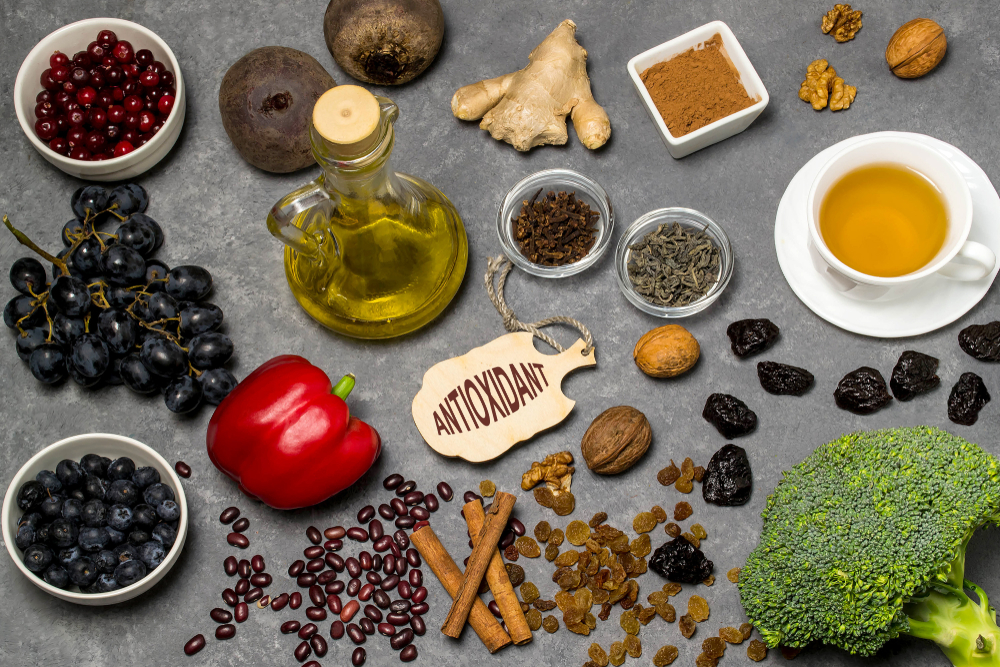oor diet and lifestyle choices effect men and women in very similar ways. For example, if we smoke our risk of developing lung disease or different types of cancers is related to amount and duration of cigarettes smoked, not on our gender. If we are overweight or obese, our risk of diet related diseases is also non-gender specific. If we follow a healthy diet, exercise and maintain a healthy weight, then many disease risk factors are reduced.
But let’s take a moment to look at the reproductive health of the men in our lives and how we can help them to focus on following a healthy lifestyle and diet to ensure that the risks of specific health issues that affect them are reduced.
The prostate gland
The prostate gland is a male reproductive organ. It’s about the size of a walnut, located between the bladder and the penis, and just in front of the anus. The urethra runs through the centre of the prostate from the bladder to the penis. Its function is the release prostate fluid, a component of semen, and helps propel this seminal fluid into the urethra during ejaculation.
As men age, their prostate gland can become enlarged, caused usually by high levels of the powerful male hormone dihydrotestosterone (DHT). An enlarged prostate however does not appear to be linked with risk of developing prostate cancer. The causes of prostate cancer are unknown, but it is recommended for any men experiencing difficulties or changes in urination habits or experience blood in their urine should seek medical advice.

How can diet help?
There is some evidence to suggest that diet and lifestyle can play a role in reducing risk of developing prostate cancer (Tantamango-Bartley et al., 2015). A vegan like diet rich in fresh fruit and vegetables and fibre and low in saturated fats, animal proteins and dairy products has suggested a lower risk in developing prostate cancer versus non-vegan diet. The authors suggested that there were different factors that could explain why a vegan diet had this effect. For example, a reduction in animal protein consumption leading to less serum insulin-like growth factor which is implicated in the development of cancer via different cell pathways. The high consumption of anti-inflammatory, antioxidant rich fruit and vegetables reduces chronic inflammation in the body a possible leading cause of some cancers.
Consumption of soy products as key protein source for vegans and vegetarians, has been seen to reduce prostate cancer risk via many different biological pathways. Good diet sources of soy are edamame beans, soya milk and tofu. Processed (canned and puree) or cooked tomatoes are the richest source of lycopene a carotenoid that is found in prostate cells, it is for this reason that research suggests a positive effect on prostate gland health (Everson & McQueen, 2004).
The negative effects of a poor diet
Overweight and obesity can cause inflammation in the body and this can increase the risk of many diseases including prostate cancer. Maintaining a healthy weight and exercising regularly reduces risk factors. As mentioned above vegans have a reduced risk of prostate issues due to their lower intake of animal protein. Red meat in particular eaten in excess, can have a negative effect on prostate health, so limiting red meat in the diet to say once or twice a week is preferred and obtaining protein needs from fish, white meat and vegetable and carbohydrate sources should be adopted.
Caffeine and alcohol are both diuretics and can exacerbate the symptoms of an enlarged prostate by increasing frequency of urination. By keeping within recommended UK alcohol limits, of 14 units per weeks should be followed to help with reducing discomfort. Limiting drinks containing caffeine will also help.
Lifestyle effects
Lowering cardiovascular risk will also help with men’s reproductive health in many ways. For example, atherosclerosis can cause high blood pressure and limit blood flow. This of course is essential for men to maintain an erection! Eating too much salt is also associated with increased risk of high blood pressure leading to blood flow issues. A diet rich in polyunsaturated fatty acids and low in saturated fats has a positive effect on vascular health. Good sources of polyunsaturated fats are oily fish such as salmon and mackerel, olive oil and some other vegetable oils, nuts and seeds.
A sedentary lifestyle not only can cause obesity but also has a negative effect on mental health. Poor mental health can effect self-esteem and this can have an impact on men’s reproductive health. Exercising outside is great for weight control and good mental health.

Sperm health
Any man wishing to start a family, should try to optimise the health of his sperm in order to ensure a successful egg fertilisation. Sperm health can be effected in many different ways, of which some effects are treatable and others are not. This blog looks at how diet could have a positive effect on sperm, but most studies in this area currently focus on association rather than cause. So following a healthy diet could possibly contribute to the production of healthy sperm, but may not cause it directly. With that in mind, adopting a healthy diet and lifestyle has a positive effect on overall health, so can only be a positive thing in general.
Negative dietary aspects
Some negative aspects of diet can have a detrimental effect on sperm quality and motility. Processed meats such as bacon, hot dogs, cured meats etc. can decrease sperm count and motility (Ricci et al., 2017). High fat dairy products and trans fats also have negative effects on sperm quality and count. So reducing dietary intake is advised. Whilst dairy products are good sources of calcium and vitamins and minerals, Public Health England recommends choosing lower fat and lower sugar versions. Trans fats are increasingly being removed from foodstuffs in the UK, but care must be taken where usage is not controlled.
Whilst soy is seen to have a positive effect on prostate health there is some evidence to suggest it has a negative effect on sperm concentration, due to its oestrogenic effect. More research is needed in this area. Other phytoestrogenic effects of pesticides which can be found in/on food stuffs and packaging can have an impact also on sperm concentration. Trying to consume unpackaged organic foods could reduce risk.
Positive effects of diet
Many foodstuffs which are good to maintain a health prostate are also good for healthy sperm. Plenty of fresh fruits and vegetables, particularly green leafy vegetables, oily fish, nuts and seeds. Particular nutrients were found in one research review to have a positive effect on sperm health; antioxidants (vitamin C, βeta-carotene, vitamin E and carotenoids) found in many fresh fruit and vegetables, folates (food sources include legumes, eggs, fruit and vegetables) (Ricci et al., 2017), zinc, found in shellfish, seeds lentils and nuts, and co-enzyme Q10 (Lafuente et al., 2013) found in offal, pork, beef, chicken, legumes, oily fish, sesame seeds and pistachios.
Conclusions
The negative effects of environment, diet and lifestyle factors are all impacting on men’s reproductive health. As men age the prostate gland naturally enlarges and can cause discomfort. There are some mechanisms that men can adopt to help alleviate symptoms, but a healthy diet and lifestyle go a long well to maintaining a healthy prostate.
Diet can help with improving sperm quality, concentration and motility, by adopting a healthy dietary lifestyle rich in fruits and vegetables and low in processed meats and saturated and trans fats. Some specific nutrients have been seen to improve men’s reproductive health such as lycopene, antioxidants, zinc and co-enzyme Q10, but more research is needed
References
Everson, Kaia. M., McQueen, Cydney, E. (2004). Lycopene for Prevention and Treatment of Prostate Cancer. American Journal of Health-System Pharmacy; 61(15)
Lafuente, R., González-Comadrán, M., Solà, I., López, G., Brassesco, M,, Carreras, R., Checa, M, A. (2013) Coenzyme Q10 and male infertility: a meta-analysis. J Assist Reprod Genet. 30 (9). Pp 1147-56 DOI: 10.1007/s10815-013-0047-5.
Ricci, E., Al-Beitawi, S., Cipriani, S., Alteri, A., Chiaffarino, F., Candiani, M., Gerli, S., Vigano., Parazzini, F. (2017). Dietary habits and semen parameters: a systematic narrative review. Andrology. Vol. 6., Issue. 1., pp 104-116 (2018). DOI: https://doi.org/10.1111/andr.12452
Tantamango-Bartley T, Knutsen SF, Knutsen R, et al. (2015), Are strict vegetarians protected against prostate cancer? Am J Clin Nutr. Published online November 11, 2015.






